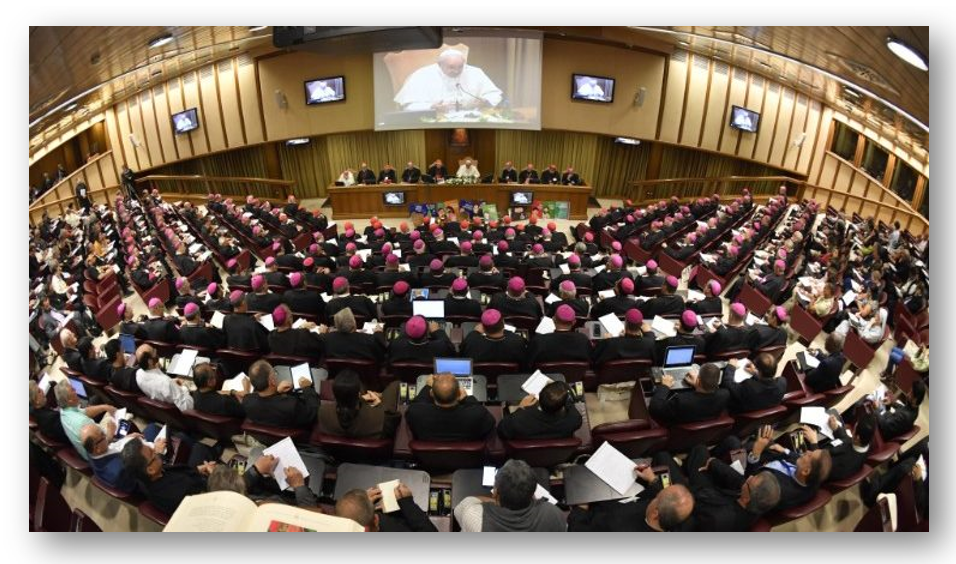
THE PREPARATORY DOCUMENT FOR THE 2023 SYNOD OF BISHOPS HAS BEEN PUBLISHED
The General Secretariat of the Synod of Bishops released on Tuesday, September 7, the Preparatory Document and the Vademecum that will accompany the next Synod on synodality. The Synod will open on October 9-10 in Rome and on October 17 in the particular Churches, and will conclude with the General Assembly in the Vatican in 2023.
To listen, "without prejudice". To speak out, "with courage and parresia". To dialogue with the Church, society and other Christian confessions. The General Secretariat of the Synod has published the Preparatory Document and the Vademecum, essential texts indicating the guidelines for the upcoming synodal journey.
The Preparatory Document is intended above all as a "tool" to facilitate the first phase of listening and consultation with the People of God in the particular Churches, which will begin in October 2021 and end in April 2022. The Vademecum, meanwhile, is designed as "a manual" offering "practical support" to diocesan referents in preparing the People of God. It includes online prayers, examples of recent synods, a glossary of terms related to the synodal process. It is "not a rule book," but "a guide to support the efforts of each local church.
A fundamental question underlies these two publications: "How is this 'walking together' that allows the Church to proclaim the Gospel today, in accordance with the mission entrusted to her, realized at different levels (from the local to the universal), and what steps is the Spirit inviting us to take in order to grow as a synodal Church?"
To answer this question, the Synod Secretariat emphasizes the need to "live a participatory and inclusive ecclesial process" that offers every person, especially those on the margins, the opportunity to express themselves and be heard; then to recognize and appreciate the variety of charisms and to examine "how responsibility and power are lived in the Church." It is also a question of "accrediting the Christian community as a credible subject and reliable partner" in the ways of dialogue, reconciliation, inclusion and participation. And also to "regenerate relations" with representatives of other faiths, civil society organizations and popular movements.
Concrete measures, therefore, that are part of a historical framework marked by the "tragedy" of COVID and in a context where the Church is confronted with a lack of internal faith, corruption and abuse. But it is precisely in these "furrows dug by suffering" that "new paths" flourish to "re-found the path of Christian and ecclesial life".
The Preparatory Document also devotes a large place to the laity. It reaffirms that all the baptized are "active subjects of evangelization" and that it is fundamental that pastors "not be afraid to listen to the flock. In a synodal Church, in fact, everyone "has something to learn" from the other.
The preparatory text then proposes questions to guide the consultation of the people of God, beginning with the question: How is the "walking together" realized today in one's particular Church? It is therefore strongly recommended to re-read the experiences of one's own diocese in this regard, taking into account the internal relationships within the diocese between the faithful, the clergy, the parishes, but also between the bishops, with the different forms of religious and consecrated life, with associations, movements and institutions such as schools, hospitals, universities, charitable organizations. It is also necessary to envisage relations and common initiatives with other religions and with the world of politics, culture, finance, work, unions and minorities.
Finally, the Document mentions ten thematic nuclei on "lived synodality" to be explored in order to enrich the consultation. These include reflecting on who is part of what we call "our Church"; listening to young people, women, consecrated persons, the rejected and the excluded; examining whether an authentic style of communication is being promoted in the community, without duplicity; assessing how prayer and liturgy guide this "walking together"; to reflect on how the community supports members engaged in service; to rethink the places and methods of dialogue in the diocese, with neighboring dioceses, with religious communities and movements, with institutions, with non-believers. It is also necessary to question the way in which authority is exercised in the Church in question, the way in which decisions are made, the tools promoted for transparency and accountability, and the formation of those in positions of responsibility.
The fruit of the reflections, explains the Secretariat of the Synod, will be condensed into about ten pages. The objective "is not to produce documents," it says, but to give birth to dreams, prophecies and hopes.
The Synod on Synodality will be solemnly opened on October 9-10 in Rome and on October 17 in the particular Churches, and will conclude with the Bishops' Assembly in the Vatican in 2023.
